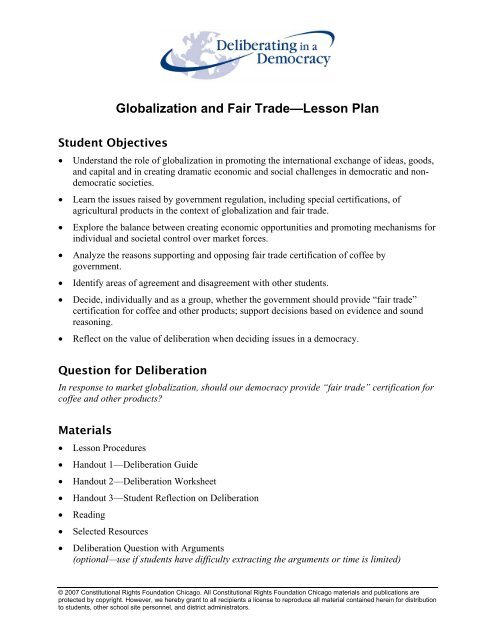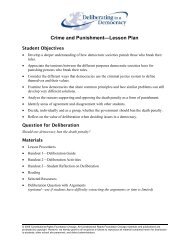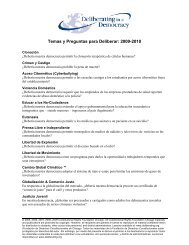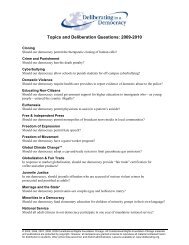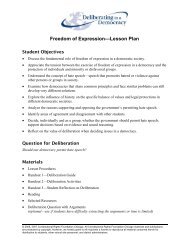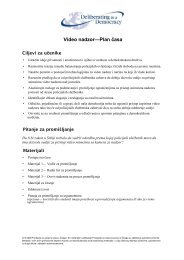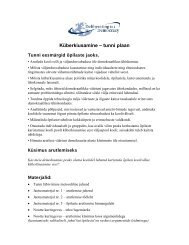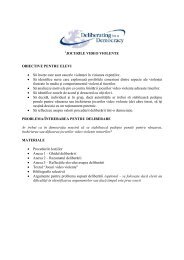Globalization and Fair TradeâLesson Plan - Deliberating in a ...
Globalization and Fair TradeâLesson Plan - Deliberating in a ...
Globalization and Fair TradeâLesson Plan - Deliberating in a ...
Create successful ePaper yourself
Turn your PDF publications into a flip-book with our unique Google optimized e-Paper software.
<strong>Globalization</strong> <strong>and</strong> <strong>Fair</strong> Trade—Lesson <strong>Plan</strong><br />
Student Objectives<br />
<br />
<br />
<br />
<br />
<br />
<br />
<br />
Underst<strong>and</strong> the role of globalization <strong>in</strong> promot<strong>in</strong>g the <strong>in</strong>ternational exchange of ideas, goods,<br />
<strong>and</strong> capital <strong>and</strong> <strong>in</strong> creat<strong>in</strong>g dramatic economic <strong>and</strong> social challenges <strong>in</strong> democratic <strong>and</strong> nondemocratic<br />
societies.<br />
Learn the issues raised by government regulation, <strong>in</strong>clud<strong>in</strong>g special certifications, of<br />
agricultural products <strong>in</strong> the context of globalization <strong>and</strong> fair trade.<br />
Explore the balance between creat<strong>in</strong>g economic opportunities <strong>and</strong> promot<strong>in</strong>g mechanisms for<br />
<strong>in</strong>dividual <strong>and</strong> societal control over market forces.<br />
Analyze the reasons support<strong>in</strong>g <strong>and</strong> oppos<strong>in</strong>g fair trade certification of coffee by<br />
government.<br />
Identify areas of agreement <strong>and</strong> disagreement with other students.<br />
Decide, <strong>in</strong>dividually <strong>and</strong> as a group, whether the government should provide “fair trade”<br />
certification for coffee <strong>and</strong> other products; support decisions based on evidence <strong>and</strong> sound<br />
reason<strong>in</strong>g.<br />
Reflect on the value of deliberation when decid<strong>in</strong>g issues <strong>in</strong> a democracy.<br />
Question for Deliberation<br />
In response to market globalization, should our democracy provide “fair trade” certification for<br />
coffee <strong>and</strong> other products?<br />
Materials<br />
<br />
<br />
<br />
<br />
<br />
<br />
<br />
Lesson Procedures<br />
H<strong>and</strong>out 1—Deliberation Guide<br />
H<strong>and</strong>out 2—Deliberation Worksheet<br />
H<strong>and</strong>out 3—Student Reflection on Deliberation<br />
Read<strong>in</strong>g<br />
Selected Resources<br />
Deliberation Question with Arguments<br />
(optional—use if students have difficulty extract<strong>in</strong>g the arguments or time is limited)<br />
© 2007 Constitutional Rights Foundation Chicago. All Constitutional Rights Foundation Chicago materials <strong>and</strong> publications are<br />
protected by copyright. However, we hereby grant to all recipients a license to reproduce all material conta<strong>in</strong>ed here<strong>in</strong> for distribution<br />
to students, other school site personnel, <strong>and</strong> district adm<strong>in</strong>istrators.
<strong>Globalization</strong> <strong>and</strong> <strong>Fair</strong> Trade—Read<strong>in</strong>g<br />
1<br />
2<br />
3<br />
4<br />
5<br />
6<br />
7<br />
8<br />
9<br />
10<br />
11<br />
12<br />
<strong>Globalization</strong> has resulted <strong>in</strong> stunn<strong>in</strong>g changes around the world. Producers <strong>and</strong> consumers<br />
now buy <strong>and</strong> sell <strong>in</strong> a worldwide marketplace: <strong>in</strong> just days, blue jeans made <strong>in</strong> Lahore can be<br />
traded <strong>in</strong> Los Angeles, shipped to Lidice, <strong>and</strong> sold <strong>in</strong> Lodz. Money crosses borders almost<br />
<strong>in</strong>stantly. News <strong>and</strong> ideas speed across the Internet. Today more people are l<strong>in</strong>ked to more<br />
<strong>in</strong>formation more quickly than ever before. Everyth<strong>in</strong>g—from mak<strong>in</strong>g shoes or grow<strong>in</strong>g wheat to<br />
prevent<strong>in</strong>g terrorism <strong>and</strong> promot<strong>in</strong>g democracy—is affected, because everyth<strong>in</strong>g is connected.<br />
The speed <strong>and</strong> extent of globalization are viewed by some as wonderful <strong>and</strong> by others as<br />
threaten<strong>in</strong>g. In many democracies, ord<strong>in</strong>ary citizens have sought ways to exercise greater<br />
<strong>in</strong>fluence <strong>and</strong> control over global decisions of governments <strong>and</strong> corporations, particularly <strong>in</strong><br />
matters of trade. An example is the fair trade movement that tries to certify a fair exchange<br />
between producers <strong>in</strong> poorer countries <strong>and</strong> consumers <strong>in</strong> richer countries for a variety of<br />
products. One such product is coffee.<br />
13<br />
14<br />
15<br />
16<br />
17<br />
18<br />
19<br />
What Is <strong>Globalization</strong>?<br />
“Few subjects have polarized people throughout the world as much as globalization,” notes<br />
Nobel Laureate economist Joseph Stiglitz. “Some see it as the way of the future, br<strong>in</strong>g<strong>in</strong>g<br />
unprecedented prosperity to everyone, everywhere.” Others, like the tens of thous<strong>and</strong>s of people<br />
who demonstrate whenever the World Trade Organization holds its meet<strong>in</strong>gs, “fault<br />
globalization as the source of untold problems, from the destruction of native cultures to<br />
<strong>in</strong>creas<strong>in</strong>g poverty.”<br />
© 2007 Constitutional Rights Foundation Chicago. All Constitutional Rights Foundation Chicago materials <strong>and</strong> publications are<br />
protected by copyright. However, we hereby grant to all recipients a license to reproduce all material conta<strong>in</strong>ed here<strong>in</strong> for distribution<br />
to students, other school site personnel, <strong>and</strong> district adm<strong>in</strong>istrators.
20<br />
21<br />
22<br />
23<br />
24<br />
25<br />
26<br />
27<br />
28<br />
29<br />
30<br />
31<br />
32<br />
Economist Jagdish Bhagwati def<strong>in</strong>es globalization primarily <strong>in</strong> terms of economics. In his<br />
view, the efforts by different governments to reduce trade <strong>and</strong> <strong>in</strong>vestment barriers, coupled with<br />
new <strong>in</strong>formation technologies, have resulted <strong>in</strong> an extraord<strong>in</strong>arily fast delivery of services <strong>and</strong><br />
capital between <strong>and</strong> with<strong>in</strong> nations. Yet with globalization, the buffers of time <strong>and</strong> space that<br />
once protected local markets are much smaller: “Producers <strong>in</strong> the poor countries [are exposed] to<br />
<strong>in</strong>creased risks as a result of shift<strong>in</strong>g to world markets <strong>in</strong> search of greater prosperity.”<br />
Religious leader Jonathan Sachs rejects a strictly economic explanation of globalization.<br />
“Mank<strong>in</strong>d was not created to serve markets,” he argues. “Markets were created to serve<br />
mank<strong>in</strong>d.” Ironically, the wealth of market choices created by globalization has resulted <strong>in</strong> “a<br />
massive loss of sovereignty over our personal lives.” The result, he says, is that “when th<strong>in</strong>gs go<br />
wrong, as at times they must, we are liable to despair, because our dest<strong>in</strong>y rests <strong>in</strong> other h<strong>and</strong>s,<br />
not our own.” A response to this anxiety, he believes, is to def<strong>in</strong>e people as more than economic<br />
agents <strong>and</strong> to take back responsibility for personal <strong>and</strong> social choices, particularly <strong>in</strong> commerce.<br />
33<br />
34<br />
35<br />
36<br />
37<br />
38<br />
39<br />
40<br />
41<br />
The <strong>Globalization</strong> of Coffee: Farmers <strong>and</strong> Producers <strong>in</strong> a World Economy<br />
Coffee has been a focus of <strong>in</strong>ternational commerce s<strong>in</strong>ce Arab merchants first brought it out<br />
of Ethiopia <strong>and</strong> began to trade it 1,000 years ago. Today, the global coffee market is worth more<br />
than $80 billion annually, <strong>and</strong> coffee is second only to oil as the most traded commodity on the<br />
planet. Yet accord<strong>in</strong>g to Transfair, a fair trade group, over half of the world’s coffee is produced<br />
by small family farmers. As Bhagwati says:<br />
Farmers who shift from traditional staples to cash crops (like coffee) because of higher<br />
returns at current prices face the prospect that this shift will lead them <strong>in</strong>to ru<strong>in</strong>ation if<br />
rivals elsewhere with lower prices suddenly move <strong>in</strong>to the market. . . . S<strong>in</strong>ce few farmers<br />
<strong>Deliberat<strong>in</strong>g</strong> <strong>in</strong> a Democracy © 2007 Constitutional Rights Foundation Chicago. 2
42<br />
43<br />
44<br />
45<br />
46<br />
47<br />
48<br />
49<br />
50<br />
51<br />
52<br />
53<br />
54<br />
<strong>in</strong> the poor countries are likely to take these downside possibilities <strong>in</strong>to account, sudden<br />
misery is a possibility.<br />
The problems of local growers were recently strik<strong>in</strong>gly demonstrated <strong>in</strong> the documentary<br />
film Black Gold. The film follows Tadesse Meskela, the General Manager of the Oromia Coffee<br />
Farmers Co-operative Union <strong>in</strong> Ethiopia, who spends most of his time travel<strong>in</strong>g the world to f<strong>in</strong>d<br />
coffee buyers who will pay his farmers a better price than that set by the <strong>in</strong>ternational<br />
commodities exchange. He represents over 100 cooperatives made up of 74,000 Ethiopian coffee<br />
farmers <strong>and</strong> close to one-half million members of their families. Without <strong>in</strong>creas<strong>in</strong>g the price of<br />
coffee, these farmers face bankruptcy. “Our hope is one day the consumer will underst<strong>and</strong> what<br />
they are dr<strong>in</strong>k<strong>in</strong>g,” says Meskela. “Consumers can br<strong>in</strong>g a change if awareness is given to<br />
consumers. It is not only on coffee, all products are gett<strong>in</strong>g a very low price—<strong>and</strong> the producers<br />
are highly affected.” Without the ability to deal directly with purchasers, most small coffee<br />
growers must sell their crops to middlemen, often at less than half its market value.<br />
55<br />
56<br />
57<br />
58<br />
59<br />
60<br />
61<br />
62<br />
Free Trade<br />
For many supporters of globalization, a central belief is that free trade—trade without<br />
governmental taxes or subsidies (price supports)—promotes economic growth for everyone,<br />
because a free market enables the best products <strong>and</strong> services to be produced at the best price. Yet<br />
the process of creat<strong>in</strong>g “free trade” has been uneven <strong>and</strong> <strong>in</strong>consistent. Some developed nations,<br />
for example, are critical of tariffs (taxes) placed on their agricultural products by poorer nations<br />
<strong>in</strong> Africa <strong>and</strong> South America. Wealthy countries, however, often subsidize their own agricultural<br />
producers, leav<strong>in</strong>g small farmers <strong>in</strong> develop<strong>in</strong>g nations at a disadvantage.<br />
<strong>Deliberat<strong>in</strong>g</strong> <strong>in</strong> a Democracy © 2007 Constitutional Rights Foundation Chicago. 3
63<br />
64<br />
65<br />
66<br />
With coffee, some corporations are respond<strong>in</strong>g to the circumstances farmers face. Starbucks<br />
Corporation, the giant American coffee producer, follows its own voluntary program for<br />
“mutually-beneficial relationships with [the] coffee farmers <strong>and</strong> coffee communities.”<br />
Another response to the precarious condition of farmers is the “fair trade” movement.<br />
67<br />
68<br />
69<br />
70<br />
71<br />
72<br />
73<br />
74<br />
75<br />
76<br />
77<br />
78<br />
79<br />
80<br />
81<br />
82<br />
83<br />
84<br />
<strong>Fair</strong> Trade<br />
Promoters of fair trade say that it can provide basic economic supports <strong>and</strong> protections for<br />
farmers. Accord<strong>in</strong>g to the <strong>Fair</strong> Trade Federation, fair trade works “by guarantee<strong>in</strong>g a m<strong>in</strong>imum<br />
wage for small producers’ harvests <strong>and</strong> by encourag<strong>in</strong>g susta<strong>in</strong>able cultivation methods. <strong>Fair</strong><br />
trade farmers also receive badly needed credit <strong>and</strong> are assured a m<strong>in</strong>imum price. For example,<br />
the fair trade price per pound of coffee is $1.26 (USD). In comparison, the world price is around<br />
$1.00 (USD) per pound with coffee growers earn<strong>in</strong>g less than 50 cents per pound.” If coffee<br />
growers received fair wages, they could <strong>in</strong>vest <strong>in</strong> health, education, <strong>and</strong> environmental<br />
protection.<br />
The <strong>Fair</strong> Trade Federation <strong>and</strong> other organizations use a system of <strong>in</strong>dependent certification<br />
to determ<strong>in</strong>e whether goods are produced accord<strong>in</strong>g to fair trade st<strong>and</strong>ards. Created <strong>in</strong> 1997, the<br />
<strong>Fair</strong>trade Label<strong>in</strong>g Organizations International (FLO) is an association of some 20 label<strong>in</strong>g<br />
<strong>in</strong>itiatives, ma<strong>in</strong>ly throughout Europe <strong>and</strong> North America. Certified producers <strong>and</strong> products can<br />
use a special symbol on coffee <strong>and</strong> other products. This symbol varies from country to country.<br />
Organic foods offer an example of how the certification process works. In the United States<br />
<strong>and</strong> <strong>in</strong> Europe, governmental agencies certify crops, livestock, <strong>and</strong> processors as “organic”<br />
accord<strong>in</strong>g to government regulations about what k<strong>in</strong>ds of fertilizers <strong>and</strong> pest controls are used.<br />
Certification has made it easier for consumers <strong>and</strong> producers to identify <strong>and</strong> market organic<br />
<strong>Deliberat<strong>in</strong>g</strong> <strong>in</strong> a Democracy © 2007 Constitutional Rights Foundation Chicago. 4
85<br />
86<br />
agricultural products. While organic food certification is conducted by governments <strong>in</strong> America<br />
<strong>and</strong> Europe, to date no nation state has adopted a fair trade certification program.<br />
87<br />
88<br />
89<br />
90<br />
91<br />
92<br />
93<br />
94<br />
95<br />
96<br />
97<br />
98<br />
99<br />
100<br />
101<br />
102<br />
103<br />
104<br />
105<br />
106<br />
<strong>Fair</strong> Trade Certification: Supporters <strong>and</strong> Opponents<br />
Advocates say that provid<strong>in</strong>g fair trade certification encourages <strong>and</strong> rewards ethical behavior<br />
<strong>in</strong> the marketplace. They note that by sponsor<strong>in</strong>g products that br<strong>in</strong>g a fair wage for workers<br />
overseas, citizens can contribute to global stability <strong>and</strong> mutual respect. In this way, establish<strong>in</strong>g<br />
certification promotes democratic pr<strong>in</strong>ciples at home <strong>and</strong> abroad.<br />
Supporters argue that fair trade certification is a perfectly reasonable <strong>and</strong> responsible exercise<br />
of government power. The government <strong>in</strong>tervenes <strong>in</strong> foreign <strong>and</strong> domestic markets through such<br />
means as price subsidies, tariffs, <strong>and</strong> quotas. Like organic certification, fair trade certification<br />
can serve broader national economic <strong>in</strong>terests, even as it helps domestic consumers. Certification<br />
assures consumers that producers receive a fair price for coffee <strong>and</strong> other products. Adopt<strong>in</strong>g<br />
certification educates consumers <strong>and</strong> producers while reta<strong>in</strong><strong>in</strong>g the power of choice. It represents<br />
a good balance between government supports <strong>and</strong> citizen choices.<br />
In addition, supporters argue that the natural outcome of unregulated markets is monopoly,<br />
not efficiency. For m<strong>in</strong>imal costs, government regulations foster greater citizen protections at<br />
home <strong>and</strong> better labor practices abroad. This k<strong>in</strong>d of <strong>in</strong>vestment promotes democratic pr<strong>in</strong>ciples<br />
through choices, not charity. Government regulations exist to protect the rights of citizens as well<br />
as those of bus<strong>in</strong>esses <strong>and</strong> corporations.<br />
Supporters also say that fair trade certification is smart politics. By guarantee<strong>in</strong>g a m<strong>in</strong>imum<br />
wage for small producers of coffee <strong>and</strong> other agricultural products, fair trade helps people <strong>in</strong><br />
other countries fight economic or cultural dislocation. More people stay<strong>in</strong>g <strong>in</strong> their communities<br />
<strong>Deliberat<strong>in</strong>g</strong> <strong>in</strong> a Democracy © 2007 Constitutional Rights Foundation Chicago. 5
107<br />
108<br />
109<br />
110<br />
111<br />
112<br />
113<br />
114<br />
115<br />
116<br />
117<br />
118<br />
119<br />
120<br />
121<br />
122<br />
123<br />
<strong>and</strong> us<strong>in</strong>g susta<strong>in</strong>able farm<strong>in</strong>g methods means less urbanization, less pollution, less urban<br />
poverty, <strong>and</strong> fewer immigrants seek<strong>in</strong>g to flee their countries.<br />
Opponents of fair trade certification counter that globalization helps make coffee production<br />
more efficient <strong>and</strong> profitable; the coffee growers who rema<strong>in</strong> are more efficient <strong>and</strong> comm<strong>and</strong><br />
better prices for their products. By contrast, government certification will distort the market <strong>and</strong><br />
<strong>in</strong>crease costs. <strong>Fair</strong> trade certification will benefit only <strong>in</strong>efficient coffee producers.<br />
Besides, argue opponents, coffee shows why fair trade certification is unnecessary. The free<br />
market responds to consumer needs <strong>and</strong> desires better than government. Markets adjust quickly<br />
to the needs of society: if consumers dem<strong>and</strong> more “fair trade” coffee, then the market will<br />
respond. By contrast, government regulations respond to political, not economic, forces.<br />
Consumer needs <strong>and</strong> desires are best met by a free market, not government regulations.<br />
In the end, opponents argue that certification is arbitrary. It imposes a particular moral<br />
viewpo<strong>in</strong>t on everyone else <strong>in</strong> society. In a world of so many different cultures, people need to<br />
have more tolerance for different values, not less. The free market respects differences without<br />
dictat<strong>in</strong>g one “right” way.<br />
<strong>Globalization</strong> will cont<strong>in</strong>ue to b<strong>in</strong>d peoples <strong>and</strong> countries closer together. How will<br />
<strong>in</strong>dividuals <strong>and</strong> nations use these new opportunities?<br />
<strong>Deliberat<strong>in</strong>g</strong> <strong>in</strong> a Democracy © 2007 Constitutional Rights Foundation Chicago. 6
<strong>Globalization</strong> <strong>and</strong> <strong>Fair</strong> Trade—Selected Resources<br />
Bhagwati, Jagdish N., “Anti-<strong>Globalization</strong>: Why?” (Chapter 1), In Defense of <strong>Globalization</strong> (Oxford: Oxford<br />
University Press, 2004),<br />
http://www.cfr.org/content/publications/attachments/Defense_<strong>Globalization</strong>_chap01.pdf.<br />
Bhagwati, Jagdish N., “What Enriches the Poor <strong>and</strong> Liberates the Oppressed?” The Times (March 5, 2004),<br />
http://www.cfr.org/publication/6843/what_enriches_the_poor_<strong>and</strong>_liberates_the_oppressed.html.<br />
“Black Gold Network,” http://www.blackgoldmovie.com/l<strong>in</strong>ks.php.<br />
Constitutional Rights Foundation, “<strong>Globalization</strong> <strong>and</strong> Worker Rights,” Bill of Rights <strong>in</strong> Action, vol. 17, no. 2<br />
(Spr<strong>in</strong>g 2001), http://www.crf-usa.org/bria/bria17_2.htm#rights.<br />
Duckett, Jane <strong>and</strong> William L. Miller, “Public Attitudes toward Anti-globalisation Protest <strong>in</strong> the Develop<strong>in</strong>g<br />
World: A Study of Czech Republic, South Korea, Ukra<strong>in</strong>e <strong>and</strong> Vietnam,” Annual Conference of the<br />
European Consortium of Political Research (Budapest: 8-10 September 2005),<br />
http://www.lbss.gla.ac.uk/politics/globalisation/Public-Attitudes-toward-Anti-Glob-Protests-ECPR-paperf<strong>in</strong>al.pdf.<br />
“<strong>Fair</strong> Trade Coffee,” Global Exchange (last updated December 18, 2006),<br />
http://www.globalexchange.org/campaigns/fairtrade/coffee/.<br />
“<strong>Fair</strong> Trade Coffee Fast Facts” <strong>and</strong> “<strong>Fair</strong> Trade Coffee Backgrounder,” Transfair USA,<br />
http://transfairusa.org/content/resources/<strong>in</strong>dex.php.<br />
“<strong>Fair</strong> Trade Coffee <strong>and</strong> Food Products,” <strong>Fair</strong> Trade Federation, http://www.fairtradefederation.org/.<br />
<strong>Fair</strong>trade Label<strong>in</strong>g Organizations International, http://www.fairtrade.net/home.html.<br />
“Grounds for Change: Creat<strong>in</strong>g a Voice for Small Coffee Farmers <strong>and</strong> Farmworkers with the Next<br />
International Coffee Agreement,” Oxfam International (2007),<br />
http://www.oxfam.org/en/policy/brief<strong>in</strong>gnotes/bn0604_coffee_groundsforchange.<br />
Ligi, Am<strong>and</strong>a, “The Pros <strong>and</strong> Cons of <strong>Globalization</strong>: Is Our Economy Headed <strong>in</strong> the Right Direction?”<br />
Associated Content (April 28, 2006),<br />
http://www.associatedcontent.com/article/29797/the_pros_<strong>and</strong>_cons_of_globalization.html.<br />
“Make Trade <strong>Fair</strong>,” Global Call to Action Aga<strong>in</strong>st Poverty, http://www.maketradefair.org.<br />
“National Organic Program,” U.S. Department of Agriculture,<br />
http://www.ams.usda.gov/NOP/NOP/NOPhome.html.<br />
Sachs, Jonathan, The Dignity of Difference: How to Avoid the Clash of Civilizations (London: Cont<strong>in</strong>uum,<br />
2002, 2003).<br />
Stiglitz, Joseph E., “Globalism’s Discontents,” The American Prospect, vol. 13, no. 1 (January 1, 2002 -<br />
January 14, 2002), http://people.cas.sc.edu/coate/Read<strong>in</strong>gs/Stiglitz.pdf.<br />
Stiglitz, Joseph E., “Ethics, Market <strong>and</strong> Government Failure, <strong>and</strong> <strong>Globalization</strong>,” N<strong>in</strong>th Plenary Session of the<br />
Pontifical Academy of Social Sciences (Cas<strong>in</strong>a Pio IV, 2-6 May 2003),<br />
http://www2.gsb.columbia.edu/faculty/jstiglitz/download/2003_Ethics_Market_<strong>and</strong>_Government_Failure_a<br />
nd_<strong>Globalization</strong>.pdf.<br />
“Susta<strong>in</strong><strong>in</strong>g Coffee Communities,” Starbucks Corporation, http://www.starbucks.com/aboutus/orig<strong>in</strong>s.asp.<br />
© 2007 Constitutional Rights Foundation Chicago. All Constitutional Rights Foundation Chicago materials <strong>and</strong> publications are protected<br />
by copyright. However, we hereby grant to all recipients a license to reproduce all material conta<strong>in</strong>ed here<strong>in</strong> for distribution to students,<br />
other school site personnel, <strong>and</strong> district adm<strong>in</strong>istrators.
Deliberation Question<br />
<strong>Globalization</strong> <strong>and</strong> <strong>Fair</strong> Trade—<br />
Deliberation Question with Arguments<br />
In response to market globalization, should our democracy provide “fair trade” certification<br />
for coffee <strong>and</strong> other products?<br />
YES—Arguments to Support the Deliberation Question<br />
1. Provid<strong>in</strong>g fair trade certification encourages <strong>and</strong> rewards ethical behavior <strong>in</strong> the marketplace.<br />
It also promotes democratic pr<strong>in</strong>ciples at home <strong>and</strong> abroad.<br />
2. <strong>Fair</strong> trade certification is a reasonable <strong>and</strong> responsible exercise of government power. All<br />
regulation is not arbitrary regulation, <strong>and</strong> democratic government can serve the people’s<br />
<strong>in</strong>terests. Legislatures <strong>and</strong> regulatory agencies can respond to the needs <strong>and</strong> desires of both<br />
small producers <strong>and</strong> consumers. Government regulations exist to protect the rights of citizens<br />
as well as bus<strong>in</strong>esses <strong>and</strong> corporations.<br />
3. <strong>Fair</strong> trade certification, like organic certification, serves both producers <strong>and</strong> consumers.<br />
Certification assures consumers that coffee <strong>and</strong> other agricultural products are sold at a fair<br />
price for producers. Adopt<strong>in</strong>g a common certification promotes uniformity between markets.<br />
It also educates consumers <strong>and</strong> producers while provid<strong>in</strong>g the power of choice.<br />
4. Government regulation is not the enemy of market efficiency. The natural outcome of<br />
unregulated markets is monopoly, not efficiency. For m<strong>in</strong>imal costs, government regulations<br />
foster greater citizen protections at home <strong>and</strong> better labor practices abroad. This k<strong>in</strong>d of<br />
<strong>in</strong>vestment promotes democratic pr<strong>in</strong>ciples through real choices, not charity.<br />
5. <strong>Fair</strong> trade certification is smart politics. By guarantee<strong>in</strong>g a m<strong>in</strong>imum wage for small<br />
producers of coffee <strong>and</strong> other agricultural products, fair trade encourages people to stay on<br />
the l<strong>and</strong> <strong>in</strong> their traditional jobs, <strong>in</strong>stead of mov<strong>in</strong>g to cities to look for work. More people<br />
stay<strong>in</strong>g <strong>in</strong> their communities <strong>and</strong> us<strong>in</strong>g susta<strong>in</strong>able farm<strong>in</strong>g methods means less urbanization,<br />
less pollution, less urban poverty, <strong>and</strong> fewer immigrants seek<strong>in</strong>g to flee their countries.<br />
© 2007 Constitutional Rights Foundation Chicago. All Constitutional Rights Foundation Chicago materials <strong>and</strong> publications are<br />
protected by copyright. However, we hereby grant to all recipients a license to reproduce all material conta<strong>in</strong>ed here<strong>in</strong> for distribution<br />
to students, other school site personnel, <strong>and</strong> district adm<strong>in</strong>istrators.
Deliberation Question<br />
<strong>Globalization</strong> <strong>and</strong> <strong>Fair</strong> Trade—<br />
Deliberation Question with Arguments<br />
In response to market globalization, should our democracy provide “fair trade” certification<br />
for coffee <strong>and</strong> other products?<br />
NO—Arguments to Oppose the Deliberation Question<br />
1. <strong>Fair</strong> trade certification will not help address the challenges of globalization. Instead, it will<br />
only impose one group’s particular morality on everyone else. Certification is <strong>in</strong>herently<br />
arbitrary. Thus, it comb<strong>in</strong>es the worst elements of managed economies <strong>and</strong> misguided<br />
moralism.<br />
2. The label “fair trade” is unnecessary. The free market will respond to consumer needs <strong>and</strong><br />
desires better than the government. Consumer dem<strong>and</strong> for fair trade coffee is a perfect<br />
example of how the market responds to what people want. Open markets do not need<br />
government meddl<strong>in</strong>g.<br />
3. <strong>Fair</strong> trade certification represents an unwelcome <strong>and</strong> mischievous element of government<br />
regulation. Regulation leads to the suppression of new ideas, <strong>in</strong>creases consumer costs, <strong>and</strong><br />
promotes government <strong>in</strong>terests at the expense of citizen needs. Powers yielded by the people<br />
to the government are rarely returned.<br />
4. The label “fair trade” is costly <strong>and</strong> <strong>in</strong>efficient. Markets adjust quickly to the needs of society,<br />
use new technologies, <strong>and</strong> generate new products <strong>and</strong> services. Government regulations<br />
respond to political, not economic forces. Consumer needs <strong>and</strong> desires are best met by a free<br />
market, not clumsy government regulations.<br />
5. <strong>Fair</strong> trade certification distorts the market. <strong>Globalization</strong> <strong>and</strong> free markets help w<strong>in</strong>now out<br />
<strong>in</strong>efficient coffee farmers who cannot effectively compete. Those farmers who rema<strong>in</strong> are<br />
more efficient <strong>and</strong> can comm<strong>and</strong> a better price for their products. The only people who want<br />
fair trade certification are the bureaucrats whose jobs depend on it <strong>and</strong> those producers who<br />
cannot compete <strong>in</strong> the global market.<br />
© 2007 Constitutional Rights Foundation Chicago. All Constitutional Rights Foundation Chicago materials <strong>and</strong> publications are<br />
protected by copyright. However, we hereby grant to all recipients a license to reproduce all material conta<strong>in</strong>ed here<strong>in</strong> for distribution<br />
to students, other school site personnel, <strong>and</strong> district adm<strong>in</strong>istrators.
Step One: Introduction<br />
Lesson Procedures<br />
Introduce the lesson <strong>and</strong> the Student Objectives on the Lesson <strong>Plan</strong>. Distribute <strong>and</strong> discuss<br />
H<strong>and</strong>out 1—Deliberation Guide. Review the Rules of Deliberation <strong>and</strong> post them <strong>in</strong> a prom<strong>in</strong>ent<br />
position <strong>in</strong> the classroom. Emphasize that the class will deliberate <strong>and</strong> then debrief the experience.<br />
Step Two: Read<strong>in</strong>g<br />
Distribute a copy of the Read<strong>in</strong>g to each student. Have students read the article carefully <strong>and</strong><br />
underl<strong>in</strong>e facts <strong>and</strong> ideas they th<strong>in</strong>k are important <strong>and</strong>/or <strong>in</strong>terest<strong>in</strong>g (ideally for homework).<br />
Step Three: Group<strong>in</strong>g <strong>and</strong> Read<strong>in</strong>g Discussion<br />
Divide the class <strong>in</strong>to groups of four or five students. Group members should share important facts<br />
<strong>and</strong> <strong>in</strong>terest<strong>in</strong>g ideas with each other to develop a common underst<strong>and</strong><strong>in</strong>g of the article. They can<br />
record these facts <strong>and</strong> ideas on H<strong>and</strong>out 2—Deliberation Activities (Review the Read<strong>in</strong>g).<br />
Step Four: Introduc<strong>in</strong>g the Deliberation Question<br />
Each Read<strong>in</strong>g addresses a Deliberation Question. Read aloud <strong>and</strong>/or post the Deliberation Question<br />
<strong>and</strong> ask students to write the Deliberation Question <strong>in</strong> the space provided on H<strong>and</strong>out 2. Rem<strong>in</strong>d<br />
students of the Rules for Deliberation on H<strong>and</strong>out 1.<br />
Step Five: Learn<strong>in</strong>g the Reasons<br />
Divide each group <strong>in</strong>to two teams, Team A <strong>and</strong> Team B. Expla<strong>in</strong> that each team is responsible for<br />
select<strong>in</strong>g the most compell<strong>in</strong>g reasons for its position, which you will assign. Both teams should<br />
reread the Read<strong>in</strong>g. Team A will f<strong>in</strong>d the most compell<strong>in</strong>g reasons to support the Deliberation<br />
Question. Team B will f<strong>in</strong>d the most compell<strong>in</strong>g reasons to oppose the Deliberation Question. To<br />
ensure maximum participation, ask everyone on the team to prepare to present at least one reason.<br />
Note: Team A <strong>and</strong> Team B do not communicate while learn<strong>in</strong>g the reasons. If students need help<br />
identify<strong>in</strong>g the arguments or time is limited, use the Deliberation Question with Arguments<br />
h<strong>and</strong>outs. Ask students to identify the most compell<strong>in</strong>g arguments <strong>and</strong> add any additional ones they<br />
may remember from the read<strong>in</strong>g.<br />
Step Six: Present<strong>in</strong>g the Most Compell<strong>in</strong>g Reasons<br />
Tell students that each team will present the most compell<strong>in</strong>g reasons to support or oppose the<br />
Deliberation Question. In preparation for the next step, Revers<strong>in</strong>g Positions, have each team listen<br />
carefully for the most compell<strong>in</strong>g reasons.<br />
© 2005, 2006, 2007 Constitutional Rights Foundation Chicago. All Constitutional Rights Foundation Chicago materials <strong>and</strong> publications are<br />
protected by copyright. However, we hereby grant to all recipients a license to reproduce all material conta<strong>in</strong>ed here<strong>in</strong> for distribution to students, other<br />
school site personnel, <strong>and</strong> district adm<strong>in</strong>istrators.
• Team A will expla<strong>in</strong> their reasons for support<strong>in</strong>g the Deliberation Question. If Team B<br />
does not underst<strong>and</strong> someth<strong>in</strong>g, they should ask questions but NOT argue.<br />
• Team B will expla<strong>in</strong> their reasons for oppos<strong>in</strong>g the Deliberation Question. If Team A<br />
does not underst<strong>and</strong> someth<strong>in</strong>g, they should ask questions, but NOT argue.<br />
Note: The teams may not believe <strong>in</strong> or agree with their reasons but should be as conv<strong>in</strong>c<strong>in</strong>g as<br />
possible when present<strong>in</strong>g them to others.<br />
Step Seven: Revers<strong>in</strong>g Positions<br />
Expla<strong>in</strong> that, to demonstrate that each side underst<strong>and</strong>s the oppos<strong>in</strong>g arguments, each team will select<br />
the other team’s most compell<strong>in</strong>g reasons.<br />
• Team B will expla<strong>in</strong> to Team A what Team A’s most compell<strong>in</strong>g reasons were for support<strong>in</strong>g<br />
the Deliberation Question.<br />
• Team A will expla<strong>in</strong> to Team B what Team B’s most compell<strong>in</strong>g reasons were for oppos<strong>in</strong>g<br />
the Deliberation Question.<br />
Step Eight: <strong>Deliberat<strong>in</strong>g</strong> the Question<br />
Expla<strong>in</strong> that students will now drop their roles <strong>and</strong> deliberate the question as a group. Rem<strong>in</strong>d the<br />
class of the question. In deliberat<strong>in</strong>g, students can (1) use what they have learned about the issue<br />
<strong>and</strong> (2) offer their personal experiences as they formulate op<strong>in</strong>ions regard<strong>in</strong>g the issue.<br />
After deliberat<strong>in</strong>g, have students f<strong>in</strong>d areas of agreement <strong>in</strong> their group. Then ask students, as<br />
<strong>in</strong>dividuals, to express to the group their personal position on the issue <strong>and</strong> write it down (see My<br />
Personal Position on H<strong>and</strong>out 2).<br />
Note: Individual students do NOT have to agree with the group.<br />
Step N<strong>in</strong>e: Debrief<strong>in</strong>g the Deliberation<br />
Reconvene the entire class. Distribute H<strong>and</strong>out 3—Student Reflection on Deliberation as a guide.<br />
Ask students to discuss the follow<strong>in</strong>g questions:<br />
• What were the most compell<strong>in</strong>g reasons for each side?<br />
• What were the areas of agreement?<br />
• What questions do you still have? Where can you get more <strong>in</strong>formation?<br />
• What are some reasons why deliberat<strong>in</strong>g this issue is important <strong>in</strong> a democracy?<br />
• What might you or your class do to address this problem? Options <strong>in</strong>clude teach<strong>in</strong>g others<br />
about what they have learned; writ<strong>in</strong>g to elected officials, NGOs, or bus<strong>in</strong>esses; <strong>and</strong> conduct<strong>in</strong>g<br />
additional research.<br />
Consider hav<strong>in</strong>g students prepare personal reflections on the Deliberation Question through written,<br />
visual, or audio essays. Personal op<strong>in</strong>ions can be posted on the web.<br />
Step Ten: Student Poll/Student Reflection<br />
Ask students: “Do you agree, disagree, or are you still undecided about the Deliberation Question?”<br />
Record the responses <strong>and</strong> have a student post the results on www.deliberat<strong>in</strong>g.org under the<br />
partnerships <strong>and</strong>/or the polls. Have students complete H<strong>and</strong>out 3.<br />
© 2005, 2006, 2007 Constitutional Rights Foundation Chicago.
H<strong>and</strong>out 1—Deliberation Guide<br />
What Is Deliberation?<br />
Deliberation (mean<strong>in</strong>gful discussion) is the focused exchange of ideas <strong>and</strong> the<br />
analysis of arguments with the aim of mak<strong>in</strong>g a decision.<br />
Why Are We <strong>Deliberat<strong>in</strong>g</strong>?<br />
Citizens must be able <strong>and</strong> will<strong>in</strong>g to express <strong>and</strong> exchange ideas among themselves,<br />
with community leaders, <strong>and</strong> with their representatives <strong>in</strong> government. Citizens <strong>and</strong><br />
public officials <strong>in</strong> a democracy need skills <strong>and</strong> opportunities to engage <strong>in</strong> civil public<br />
discussion of controversial issues <strong>in</strong> order to make <strong>in</strong>formed policy decisions.<br />
Deliberation requires keep<strong>in</strong>g an open m<strong>in</strong>d, as this skill enables citizens to<br />
reconsider a decision based on new <strong>in</strong>formation or chang<strong>in</strong>g circumstances.<br />
What Are the Rules for Deliberation?<br />
• Read the material carefully.<br />
• Focus on the deliberation question.<br />
• Listen carefully to what others are say<strong>in</strong>g.<br />
• Check for underst<strong>and</strong><strong>in</strong>g.<br />
• Analyze what others say.<br />
• Speak <strong>and</strong> encourage others to speak.<br />
• Refer to the read<strong>in</strong>g to support your ideas.<br />
• Use relevant background knowledge, <strong>in</strong>clud<strong>in</strong>g life experiences, <strong>in</strong> a logical way.<br />
• Use your heart <strong>and</strong> m<strong>in</strong>d to express ideas <strong>and</strong> op<strong>in</strong>ions.<br />
• Rema<strong>in</strong> engaged <strong>and</strong> respectful when controversy arises.<br />
• Focus on ideas, not personalities.<br />
© 2005, 2006, 2007 Constitutional Rights Foundation Chicago. All Constitutional Rights Foundation Chicago materials <strong>and</strong><br />
publications are protected by copyright. However, we hereby grant to all recipients a license to reproduce all material conta<strong>in</strong>ed here<strong>in</strong><br />
for distribution to students, other school site personnel, <strong>and</strong> district adm<strong>in</strong>istrators.
H<strong>and</strong>out 2—Deliberation Activities<br />
Review the Read<strong>in</strong>g<br />
Determ<strong>in</strong>e the most important facts <strong>and</strong>/or <strong>in</strong>terest<strong>in</strong>g ideas <strong>and</strong> write them below.<br />
1) ___________________________________________________________________________<br />
2) ___________________________________________________________________________<br />
3) ___________________________________________________________________________<br />
Deliberation Question<br />
Learn<strong>in</strong>g the Reasons<br />
Reasons to Support the Deliberation<br />
Question (Team A)<br />
Reasons to Oppose the Deliberation<br />
Question (Team B)<br />
My Personal Position<br />
On a separate sheet of paper, write down reasons to support your op<strong>in</strong>ion. You may suggest<br />
another course of action than the policy proposed <strong>in</strong> the question or add your own ideas to<br />
address the underly<strong>in</strong>g problem.<br />
© 2005, 2006, 2007 Constitutional Rights Foundation Chicago. All Constitutional Rights Foundation Chicago materials <strong>and</strong><br />
publications are protected by copyright. However, we hereby grant to all recipients a license to reproduce all material conta<strong>in</strong>ed<br />
here<strong>in</strong> for distribution to students, other school site personnel, <strong>and</strong> district adm<strong>in</strong>istrators.
Name:<br />
Date:<br />
Teacher:<br />
H<strong>and</strong>out 3—Student Reflection on Deliberation<br />
Large Group Discussion: What We Learned<br />
What were the most compell<strong>in</strong>g reasons for each side?<br />
Side A: Side B:<br />
What were the areas of agreement?<br />
What questions do you still have? Where can you get more <strong>in</strong>formation?<br />
What are some reasons why deliberat<strong>in</strong>g this issue is important <strong>in</strong> a democracy?<br />
What might you <strong>and</strong>/or your class do to address this problem?<br />
Individual Reflection: What I Learned<br />
Which number best describes your underst<strong>and</strong><strong>in</strong>g of the focus issue? [circle one]<br />
1 2 3 4 5<br />
NO DEEPER<br />
MUCH DEEPER<br />
UNDERSTANDING<br />
UNDERSTANDING<br />
What new <strong>in</strong>sights did you ga<strong>in</strong>?<br />
What did you do well <strong>in</strong> the deliberation? What do you need to work on to improve your<br />
personal deliberation skills?<br />
What did someone else <strong>in</strong> your group do or say that was particularly helpful? Is there anyth<strong>in</strong>g<br />
the group should work on to improve the group deliberation?<br />
© 2005, 2006, 2007 Constitutional Rights Foundation Chicago. All Constitutional Rights Foundation Chicago materials <strong>and</strong><br />
publications are protected by copyright. However, we hereby grant to all recipients a license to reproduce all material conta<strong>in</strong>ed<br />
here<strong>in</strong> for distribution to students, other school site personnel, <strong>and</strong> district adm<strong>in</strong>istrators.


